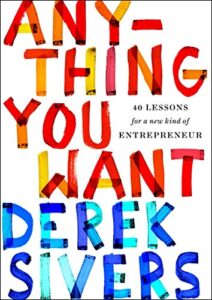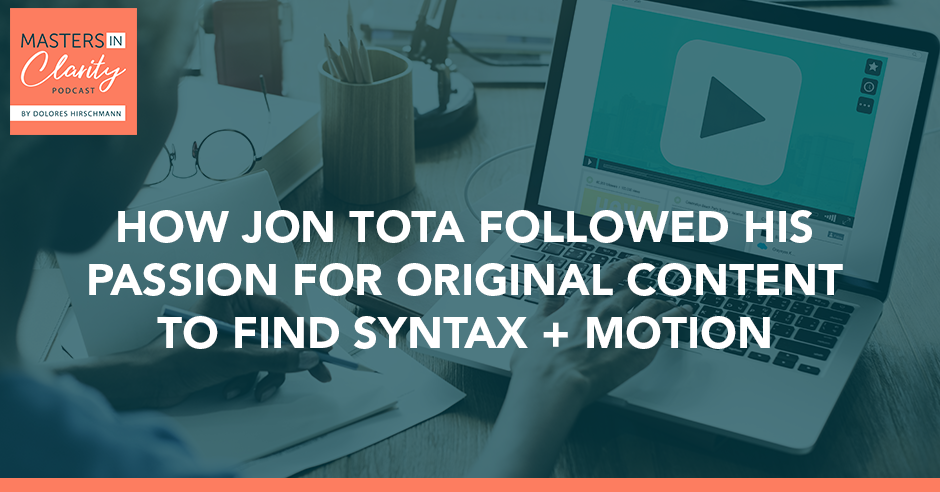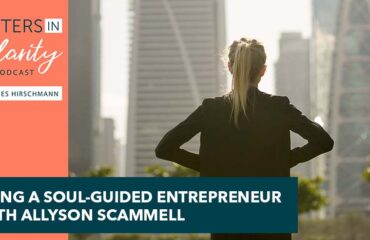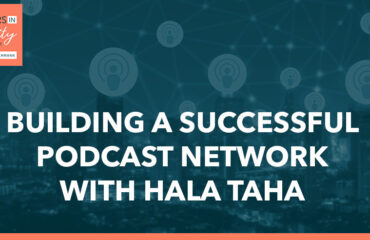If you are passionate about something, you can make it work. Just do it! This is exactly what Jon Tota did with his passion for creating original content. He created a video training platform before it was cool but then sold the company in 2020. He didn’t give up and he got back to creating original video content at his latest company, Syntax + Motion. Dolores Hirschmann brings Jon in to talk about his entrepreneurial career and his passion for creating original content. Learn how to just do what you love and stick with it. Also, find out what he does now in the realm of synthetic media.
—
Watch the episode here:
Listen to the podcast here:
How Jon Tota Followed His Passion For Original Content To Find Syntax + Motion
I am so excited about my next guest. Jon Tota is an EdTech entrepreneur, digital media innovator and podcast host of the Learning Life Show. He helps clients with their online course strategy, producing innovative digital media and creating digital avatars of thought leaders, influencers and personalities. You do not want to miss this amazing conversation with Jon.
—
Jon, thank you so much for taking the time to connect. We’ve known each other for a few years now, but we still have a missing date of skiing together.
It’s great to be here with you, Dolores. We’ve got to do it in person and hopefully, it will be on the slopes.
In this show, we are all about understanding that clarity or confusing journey that each one of us took to get to where we are. What was the journey that brought you here and how much clarity or confusion did you experience in the journey?
It’s probably a lot of a combination of both as everybody. As you know a little bit from my background, I started out of college back in the mid-90s as a screenwriter. I failed as a screenwriter. I wrote a bunch of scripts and I got a bunch of options, but nothing ever got produced. I ended up going to Wall Street, that’s where my family had always worked and I got into technology. I wasn’t trained to do any network technology or anything, so I took the opportunity to learn something I didn’t know that I was interested in.
Believe in your idea and take the leap of faith. You don’t have to always be practical.
One thing led to another. I took a job with a small technology consulting firm. In 2002, I partnered with a couple of guys from that consulting company to start Edulence, which was my first company. At the time in 2002, it was before YouTube, people weren’t doing a lot of online videos. Our idea was to develop a platform for online video specifically for training. We were in the financial services space. We started that and we had a lot of confusion doing something before the market was ready. We had never been software developers.
That company ran for eighteen years. We learned a lot because online video and the internet advanced a ton over that period of time. We had to evolve our platform and our offering. There were a lot of moments where we were very confused, and then times when we had those moments of clarity. We pivoted the business probably at least 3 or 4 times. That company was acquired in 2020. It was a big success for all of us and it was a good exit. If we knew more clearly what we were doing, we might have gotten to an exit about 7 or 8 years sooner.
Let me unpack a little bit what you said because part of the purpose of this show is to shed light on the journey of many of us entrepreneurs who have multiple businesses or just one business. There’s a myth about our linear path and our capacity to know what we’re doing at all times. Every time I talk to my guests, none of it was totally linear nor clear. There’s a common through-line to many of my guests, which is we’re all visionaries.
You said it’s like, “We knew what we were doing in 2002, but there was nobody else who knew what we were doing or seeing what we were seeing.” How do you handle an idea and a vision that is clear, and the confusion comes with the disconnect with the market? Your vision is here but the market is here. Any innovation is about thinking and imagining something that doesn’t exist. The risk and the challenge for any visionary is, “How long do I have to wait or how much do I have to work the market up to educate, to be able for my vision that is so clear match a market that is not ready?”
It’s a great point because it’s something that as entrepreneurs we all struggle with. It’s that if you are passionate about your idea and you feel like it can change your industry and the world, it should be something that no one else is doing. If no one else is doing it, it’s great for you personally. It feels good because you’re an innovator, but then reality hits you. It’s like, “No one’s ever had a budget for this. They’ve never paid for this before.” It’s that aspect of believing in yourself and your vision, and following that passion. For us, streaming video didn’t work very well in 2002. Every presentation would rebuffer and there was always someone with CD-ROMs and DVDs who are like, “You’re crazy. It’ll never work.”
You have to have the conviction, but it is taking that leap of faith a little bit on your instincts. In my world where you’re in the technology space, if you start thinking practically, you’d say, “This is crazy. It’s never going to work.” It’s having good partners. A lot of people say this with technology companies, that you should always find a good cofounder because it helps a lot to have someone else who believes the same vision as you do.
Have that complementary energy so that you can stick with the vision even when you’re confused about why the demand is not there. That’s where the confusion comes. You’ve evolved and exited that business. What’s happening now? Let’s talk about your work in 2021. What problem do you solve?

Creating Original Content: When the pandemic hit, no one could come into a studio and do videos. But audio was very available to everyone. And it’s interesting how you can innovate with audio as a learning tool.
I’m addicted to technology solutions. I said that I wanted to get back to my roots as an aspiring screenwriter. When I got out of college, I always wanted to create original content. We made a good living producing content for our customers to put into our platform. Our product was called Knowledgelink. It was a video-based learning management system. It is primarily used in financial services, but with a lot of other people as well.
What everybody needed was content. We always said that part of our business was always developing the content that people needed because it was a necessary evil. It was also something I loved. I love production and I always wanted to create content. I wanted to create feature-length films, not necessarily corporate communications and training videos. I love the creative outlet.
When we closed on the acquisition of Edulence, it was in the Spring of 2020, which was right at the start of the pandemic when everything was getting shut down. Syntax + Motion, which is my new company here in Burlington, Vermont, started up as a production company to produce content for thought leaders, experts and training companies. We don’t produce commercials or advertising content. What we focused on is producing knowledge products. The problem was at the start of the pandemic, we realized very quickly that no one could come to a studio and do video, but audio was very available to everyone.
Fast forward years later, we’ve opened up our full studio here in Burlington. People are able to come back to the studio and we’re producing a lot of interactive videos, the choose your own ending content. We also do a ton with audio and we’re interested in how you can innovate with audio as a learning tool. I’m a big fan of audiobooks and podcasts. We want to help people do as much as they can with all the different media formats that are out there.
I was telling you about this work I’m doing with a tour with Pete. We talked with John Lee Dumas from Entrepreneurs on Fire. He was one of the guests. He has an amazing podcast. There are so many mediums. One of the things I’ve learned is it’s more about getting the professional content out and being consistent with it, than having all of the different contents built and produced at the same time. This is more for the work that you do with your clients. It doesn’t matter which one, as long as you stick with it and you do it well.
Someone had helped me with this a long time ago. I launched my podcast show back in 2017. We’ve done YouTube video series over the years. We’d launch them all the time because I had that passion for video. I would keep having starts and stops with a blog because I thought of myself as a writer. As soon as I started recording the podcast, I realized that it was the perfect medium for me. It was the one thing I could do consistently. Once my team saw me doing it back in 2018. They said, “Let’s turn it into a weekly show and do it consistently because it’ll work if we stick to the schedule and do it.”
Starting then, we’ve released a weekly episode every week with a couple of breaks throughout the year. Since 2018, we have recorded about 180 episodes. To your point, I found the media format that worked for me. It may not be the right one for everyone but when you lock in on that, that’s the thing that you narrow in and say, “I’m going to do this and I’m going to be focused on the best content possible.” In that format, I don’t have to do 5 or 6 different platforms.
If you’re reading this, Jon is saying, “Permission to find one medium, be consistent and do it well,” versus this “should” that we’re all under in which we need to do everything. Thank you, Jon, because part of the show is deconstructing the myth around digital marketing or online businesses where we have to do so much to succeed. The game is professional content in a consistent way but do it well, do one and stay on it. It’s what you’re saying.
Find the thing that you’re so passionate about that you don’t mind doing it on a regular basis.
Sometimes, you look at competitors or peers and you see their great YouTube channel and the things they’re putting out on Instagram. Your first instinct is to say to your team, “Let’s start doing that. We need to do that too.” You have a lot of decent content in different places where you can find the thing that you’re so passionate about because that media format works for you, and you’ll do it consistently. You don’t mind doing it on a regular basis. For me, when recording a podcast episode, I would come out of the studio so charged up because I love doing those. They’re great.
I’ve been a guest in your podcast so I know you have guests. Are they all guests or do you have a mix of you alone and guest?

Creating Original Content: Synthetic media is when you can synthesize your voice, shoot a video. And then in two weeks, you can turn into an avatar that looks and sounds exactly like you.
On my show, it’s interview format. I always interview guests. We played with the idea where I would work in some episodes where it’s original content. Instead, what we’ve done is we’ve launched multiple shows now. We have a scripted fiction show. We buy screenplays from up and coming writers and then we produce them as audio fiction. It’s so much fun too. We only do three-episode stories. It’s three acts, beginning, middle and end. It’s great because we will only buy a script from someone who hasn’t been produced yet. It’s very cost-effective but we hire a professional voice-over talent. They get to see their story come to life, which is great and it’s fun.
It becomes part of their portfolio. You’re helping them out and you’re producing great content.
For our team, it gives them another creative outlet because interview shows are fine, but for someone like my head of production that does sound engineering, he loves doing a scripted fiction show. It’s a lot more work but he designs the soundscape and all the effects and the voice. They get to work with voice actors. I’m perfectly fine financing the production of audio fiction, video fiction or feature films.
What is the impact, ultimately? We are entrepreneurs. We have financially abundant companies. Most of us like success and financial success, but we could have that success working for someone at some point. There’s a little bit of wanting impact, at least for me. Is that true for you as well? What does impact look like for you?
We’ve all had those moments. I came up in a Wall Street family. All of my siblings went and worked on Wall Street. You can make a lot of money on Wall Street and you can do it in a lot of different ways. I always hear from people when I mentor young up-and-coming entrepreneurs to be clear. There are easier ways to make good money than starting your own business.
All you see in the news are huge successes. That’s a small percentage. The core value for me has always been freedom. Early on, I didn’t want to have to be told what to do. I would accept all the risks that went along with it, and the times when you don’t make much money. You’ve got to figure out ways to make ends meet. If you have no ceiling on you and there’s no one telling you that you can only go so far, you have that freedom, and also to pivot and go in different directions.
They all can make a bigger impact in a different way and I don’t have to get permission. It’s having that freedom both in the way you run your business and hopefully, financial freedom if it all works, but also the quality of life. To be able to do what we do in Burlington, Vermont is a quality of life thing because I’m near to all of the things I like to do. That would be hard if I needed to find a good-paying job here.
You would have to move back into the city where you come from. What are you most excited about in the next twelve months?
This goes back to the start of the pandemic when we started figuring how we were going to pivot and innovate using audio-only because our clients couldn’t come into the studio. We started working with little animated characters that you could match up an MP3 file so a client would record an audio track. We’d match them up with a cartoon avatar that we created to look like them. It was okay and it worked for some people in some cases.
We started working with technology where it’s essentially synthetic media. Everyone talks about Deepfakes on social media and things like that. There is this very small corner of the industry that’s starting to grow where synthetic media for business purposes is becoming a real thing. We outfitted our studio here to produce AI avatars for thought leaders, personalities and influencers.
It’s an avatar that moves and talks like me.
What’s fascinating is that someone who is a professional speaker, and is on the road half the year normally, come into the studio for 3 or 4 hours with us. We synthesize their voice and shoot video footage of them. In about two weeks, we turn that video footage into an avatar that looks exactly like you and the voice files speaks like you. You can text or email scripts to us and have videos. Consistency can be achieved without you having to go in front of the camera all the time.
Let me make sure I get this straight. It looks like me not in a cartoon way but like the lady in the airport that says, “Put your bags in the carousel.” It’s like Star Wars.
Yes. You see it in big studio films. They’ve been doing this for a little while. You see the Tom Cruise Deepfakes that the guy produced that were out on social media. It’s getting mainstream where someone like you could come into our studio in half the day and within weeks, you have an avatar that looks and sounds like you. You can text in scripts and be shooting content out on a consistent basis.
Can you change my outfit?
Be clear because there are easier ways to make good money than starting your own business.
We can’t change outfits yet.
I can’t gain weight. In ten years, I look like this.
You are frozen in time. It’s the dream we’ve all wanted. The headshot that I use is still ten years old for everything. People see me in video and they go, “That guy is old now.”
For women, hair and makeup is a problem.
It’s so funny you say that because we shot three avatars with professional women speakers. That was the one thing that came up. We interviewed them afterwards because a lot of this is figuring out, “Why would you want an avatar? What will you use it for? What’s the business case?” They all said the same thing that looking camera-ready with makeup and hair is a pain to do, so we do it once. We have the makeup artist and hairstyle come in. They make them look perfect on camera for that one shoot, and then you don’t have to worry about it every time.
I’m very excited about what you’re doing and the concept of it. Our industry is going into AI integration. We have gone to the point where in order to succeed, thought leaders need to produce content at such speed that is almost not humanly possible, especially video content. If you can think that you can write it and create a video in the same lapse of time, that is brilliant and amazing. I’m going to be sending some people your way. What book, podcast or series should we all check out? What must we consume that is worth our time?

Anything You Want: 40 Lessons For A New Kind Of Entrepreneur
I love this book Anything You Want by Derek Sivers. I always mention this because a lot of people haven’t heard of Derek Sivers. He’s got amazing TED Talks out there if you search him online. He’s also a very prolific writer and he writes in a very approachable way that’s easy to digest. He’s a great entrepreneur as well and had a ton of success. It’s one of those books that I always say to any entrepreneur. A lot of these books you read and then as you get into it, you go, “Those are all hard things for me to be able to accomplish myself.” He breaks it down into these easy, quick things. I love that.
I have to say Game Changers. It’s a documentary. I think it’s on Netflix. My wife would insist that I mention that because she’s a vegan, totally plant-based. She is gradually converting our whole family over to being plant-based by recommending Game Changers to everyone. It is fascinating when you watch that documentary, the way your body processes foods and how beneficial being plant-based is. For me, I’m not there yet, but I eat far more plants, fruits and vegetables than I ever did before. Game Changer is super cool. It’s a very interesting one.
Thank you so much, Jon, for joining us and telling us your story and vision. Any parting thoughts that you want to share with our readers?
The theme of your show and some of the episodes that I’ve listened to which I’ve enjoyed is this topic of looking at these moments of confusion or when there’s zero clarity, and trying to work through them and turn those into breakthrough moments that become clarity. For me, there are these three distinct moments in our business history where we were probably at the start of it. It’s the most confused and the most off-track that we were.
The breakthrough pivot that we made at that moment led to the things that came after that. For anybody reading, rather than looking at those big moments of confusion as an obstacle, think of them as an opportunity and a point of pivot for your business. For a lot of people, that can also help you work through it and end up in a more positive way than to look at the challenge.
The keyword there is what emotion are you putting into your confusion? If you keep a positive emotion, then that confusion is your launchpad. If you put a negative emotion and you don’t manage your self-talk, which is our responsibility, then that confusion might be that confusion without an opportunity.
I love that you mentioned watching the energy and emotion that you’re bringing into the moment of confusion. I agree with you that it is from the darkness and some dark moments that we find the light of our next opportunity or our next level of growth. We have to protect ourselves and be aware of how we are experiencing it when we’re losing perspective and we’re sinking into it. Mr. Jon, where can people find you?
I’m Jon Tota on LinkedIn. The Learning Life Show is my podcast. Everything I do is I put into that show. LearningLifeShow.com is the website. You can learn more about me there and listen to some of the great episodes. It’s on Apple Podcasts, Spotify, Google Play, wherever you get your podcast. Learning Life, wherever you find us, that’s the best way to find out a lot about me.
Thank you Jon for taking the time to chat with us and to connect. Let’s make a date to go ski.
That’ll be fun. Thank you for having me.
—
I had an amazing conversation with Jon Tota. Not only we would touch on his experience and career in online learning and how he exited from his business very successfully, but he’s now in a project where he’s combining AI or artificial intelligence and video production. He showed me some examples and here’s what we talked about. In his studio in Burlington, Vermont, he’s able to record you as a thought leader, and then using artificial intelligence or AI, he can produce future videos from a script that you send them. They synthesize your voice, image and movement. This is not like a comic or animation of you. This is your live version powered by AI. I’m thinking that maybe I’ll do it so that I can create consistent content with professional video at a very fast pace. You do not want to miss my conversation with Jon and see what the future brings for us content creators.
Important Links:
- Learning Life Show
- Jon Tota – LinkedIn
- Syntax + Motion
- Anything you Want
- Learning Life Show – Podcast
- Apple Podcasts – Learning Life with Jon Tota
- Spotify – Learning Life with Jon Tota
- Google Play – Learning Life with Jon Tota
- Facebook – Learning Life with Jon Tota
- @LearningLife_Podcast – Instagram
- @LearningLifePodcast – LinkedIn
- @SyntaxProductions – LinkedIn
About Jon Tota
 I started as a screenwriter, then went to Wall Street and found my way into computers in the late 90’s. I co-founded Edulence in 2002, created Knowledgelink as one of the first video training platforms in 2004, sold the company in 2020 and got back to creating original video content at my latest company, Syntax + Motion.
I started as a screenwriter, then went to Wall Street and found my way into computers in the late 90’s. I co-founded Edulence in 2002, created Knowledgelink as one of the first video training platforms in 2004, sold the company in 2020 and got back to creating original video content at my latest company, Syntax + Motion.
Today, I help clients with their online course strategy, producing innovative digital media and creating digital avatars of thought leaders, influencers and personalities.






